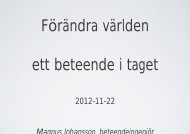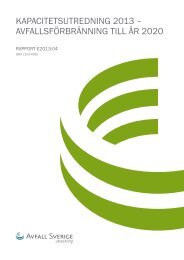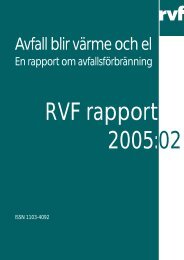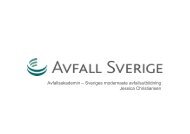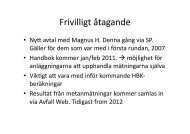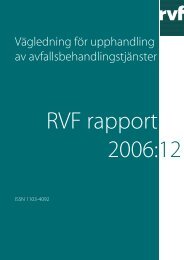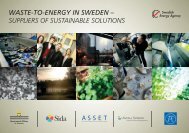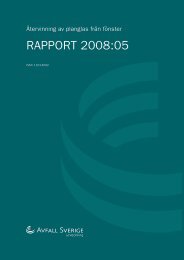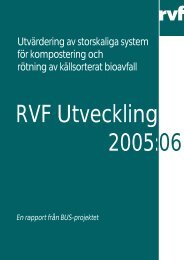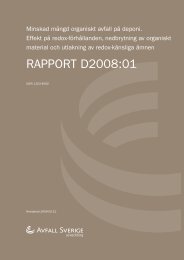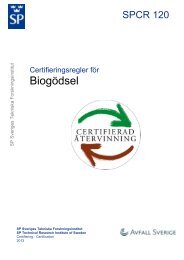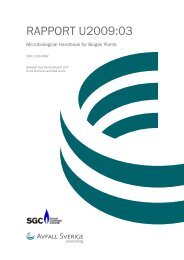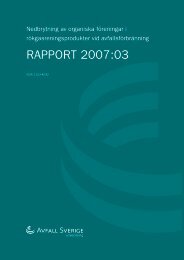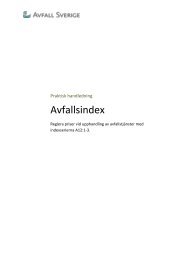SwediSh waSte management |2011 - Avfall Sverige
SwediSh waSte management |2011 - Avfall Sverige
SwediSh waSte management |2011 - Avfall Sverige
Create successful ePaper yourself
Turn your PDF publications into a flip-book with our unique Google optimized e-Paper software.
Swedish waste <strong>management</strong> 2011PrefaceWaste <strong>management</strong> in Sweden is focusingmore and more on waste minimization andwaste prevention. Waste minimization is a toppriority for the members of <strong>Avfall</strong> <strong>Sverige</strong> –Swedish Waste Management. This philosophyis exemplified by the long term vision – “ZeroWaste” – adopted at the 2011 Annual Meeting.The vision includes two long-term goals for2020: a) to break the relationship betweenwaste and growth and b) to achieve clear,strong upward movement in the waste hierarchy.The municipalities are key players and thevision states that the municipalities are thedrivers in the transition and the guarantee forlong-term sustainable waste <strong>management</strong>.Sweden and Europe as a whole are strivingto reduce waste quantities. The EU frameworkDirective on Waste requires member states towork to prevent waste generation. Memberstates must develop waste reduction planswith the goal of reducing waste by 2020.Nationally, <strong>Avfall</strong> <strong>Sverige</strong> – Swedish WasteManagement and the local authorities are keyplayers in this process.<strong>Avfall</strong> <strong>Sverige</strong> – Swedish Waste Managementis also the national coordinator of the EUproject “European Week for Waste Reduction”,also supported by the Swedish EnvironmentalProtection Agency. The project is aimed atreducing waste quantities as well as theamount of hazardous substances in the waste.2010 saw the waste quantities decreasingfor the second consecutive year. While it is stilltoo early to draw substatial conclusions, it isencouraging that the trend may have reversed.It is imperative however, not to forget theimportant task of taking care of the waste thatis generated, despite all prevention efforts.From information and collection to processingand recycling, with constantly evolving methods,the Swedish waste <strong>management</strong> systemis today environmentally sound, sustainableand sociallially responsible.District heating from waste is replacing fossilfuels, as is biogas derived from food waste.Recycling helps to reduce extraction of virginraw materials.Sweden is one of the leading nations inwaste <strong>management</strong> –an impressive 99 percentof the household waste is recycled asenergy or material. The environmental objectiveto recycle at least 50 percent of householdwaste, including biological treatment, by2010 was essentially met.With Swedish Waste Management 2011, weturn to participants in the waste industry, policymakers, government agencies, educationalinstitutions, media and all other interestedparties. We present text, figures and tablesdescribing how household waste is handled inSweden.Statistics in the annual publication SwedishWaste Management 2011 are obtained fromthe Swedish Waste Management’s web-basedstatistics system <strong>Avfall</strong> Web, and from theproducers’ organizations. We hope this publicationwill increase interest in Swedish waste<strong>management</strong>.Weine Wiqvist, Managing Director<strong>Avfall</strong> <strong>Sverige</strong> – Swedish Waste Management3



